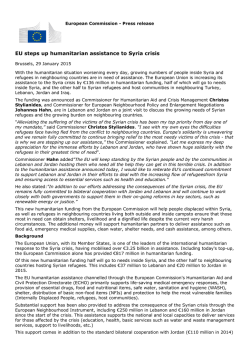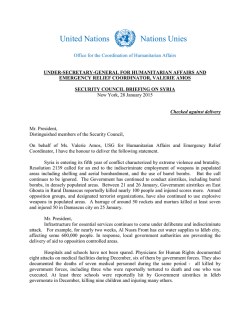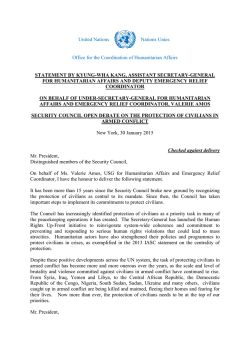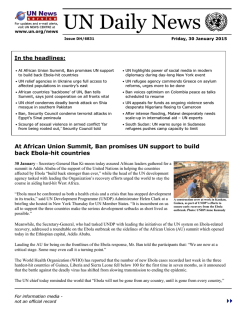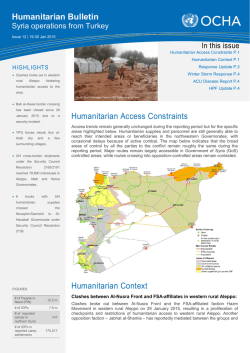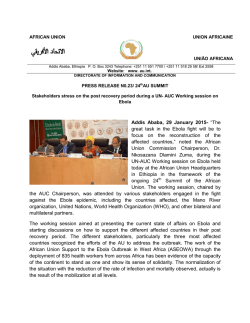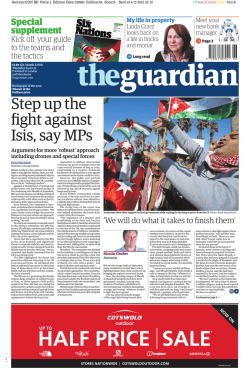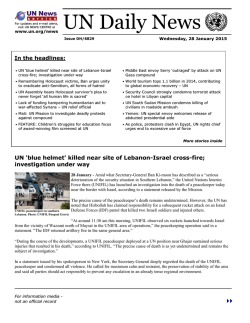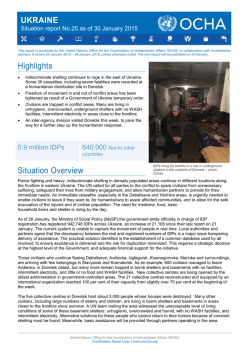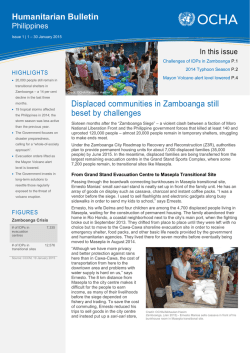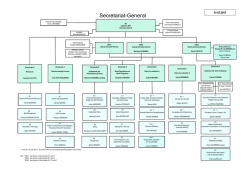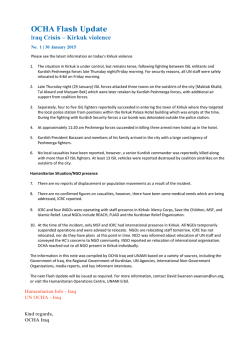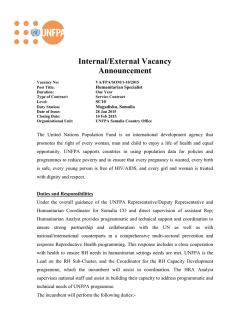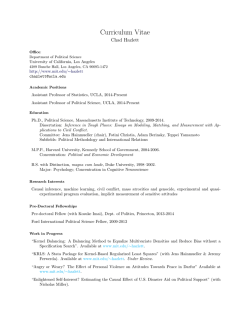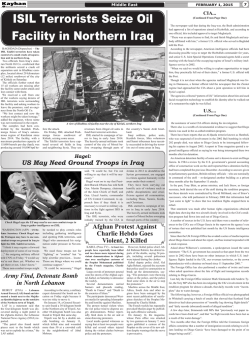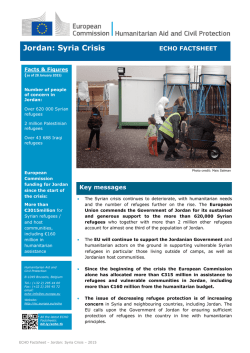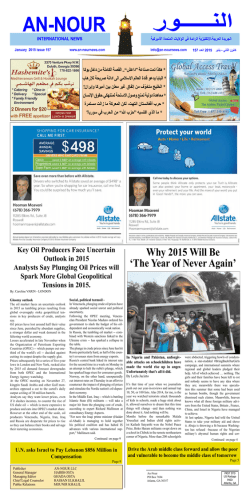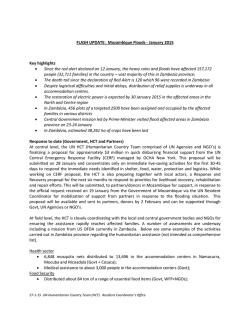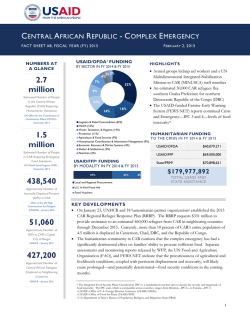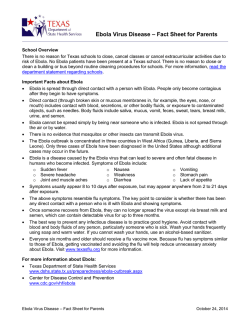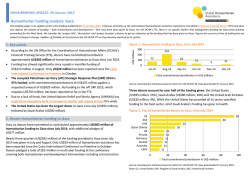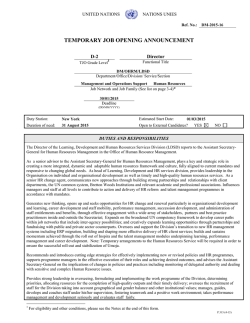
29 January 2015
For updates and e-mail alerts, visit UN NEWS CENTRE at www.un.org/news UN Daily News Thursday, 29 January 2015 Issue DH/6830 In the headlines: • With recorded Ebola cases reaching new lows, UN • UN forecasts ‘worrisome’ 2015 outlook on • As fallen peacekeeper honoured in Lebanon, UN • DR Congo: Security Council renews sanctions, • Haiti: Security Council visit shed important light on • Security Council approves 6-month extension for health agency targets ending epidemic expresses concern over security situation situation as elections loom, members say • Ban condemns destruction of villages, displacement of thousands in Darfur humanitarian front for Somalia extends mandate of expert monitoring group UN peacekeeping force in Cyprus • UNESCO chief denounces killing of journalists in South Sudan, Iraq • Children face ‘new generation’ of crises, UNICEF • Parties agree ‘in principle’ to move UN-mediated • Iraq: UN mission applauds Government • UN agency urges greater protections for ‘inland warns launching record $3 billion appeal investigation into sectarian massacre political talks to Libya fisheries’ More stories inside With recorded Ebola cases reaching new lows, UN health agency targets ending epidemic 29 January - This week, the number of Ebola cases in West Africa has fallen below 100 for the first time in seven months, the World Health Organization reported today as it announced that the battle against the deadly virus has shifted from slowing transmission to ending the epidemic. Highly contaminated waste is removed from an Ebola Treatment Unit and carried with caution to a disposal area, where it will be fed into an incinerator that burns it into ashes. Photo: WHO/R. Sørensen “To achieve this goal as quickly as possible, efforts have moved from rapidly building infrastructure to ensuring that capacity for case finding, case management, safe burials, and community engagement is used as effectively as possible,” WHO said in its latest update containing data up to 25 January 2015. The WHO announcement came as the United Nations focused on recovery aspects of the Ebola epidemic that affected Guinea, Liberia and Sierra Leone the most. The Special Representative of the Secretary General on Ebola, Ould Cheikh Ahmed, was to participate in a UN-African Union stakeholders meeting in the Ethiopian capital on the reconstruction of the affected countries, as the Executive Boards of the UN Development Programme (UNDP), UN Population Fund (UNFPA) and the UN Office for Project Services (UNOPS) was meeting today on Ebola Recovery at UN headquarters. According to WHO, the response to the Ebola epidemic has now moved to a second phase, “as the focus shifts from slowing transmission to ending the epidemic.” For information media not an official record UN Daily News -2- 29 January 2015 The agency in its update, said “for the first time since the week ending 29 June 2014, there have been fewer than 100 new confirmed cases reported in a week in the 3 most-affected countries.” “A combined total of 99 confirmed cases were reported from the 3 countries in the week to 25 January: 30 in Guinea, 4 in Liberia, and 65 in Sierra Leone,” according to the WHO update. “Case incidence continues to fall in Liberia and Sierra Leone,” it said, but noted that “Guinea reported 30 confirmed cases in the week to 25 January, up from 20 confirmed cases in the previous week.” The number of total cases was reported at more than 22,000 with some 8,800 deaths. As fallen peacekeeper honoured in Lebanon, UN expresses concern over security situation 29 January - A memorial service was held this morning at Lebanon’s International Airport in Beirut in honour of a peacekeeper from the UN Interim Force in Lebanon (UNIFIL) who lost his life yesterday in the line of duty in the southern part of the country. Lance Corporal Francisco Javier Soria Toledo of Spain was killed while deployed at a UN position near Ghajar during the serious fighting incident yesterday along the border with Israel on the “Blue Line,” a UN spokesman said. Reporting on the incident yesterday, UNIFIL said that at around 11:30 a.m. it had observed six rockets launched towards Israel from the vicinity of Wazzani north of Maysat in the UNIFIL area of operations. The Israel Defense Forces (IDF) returned artillery fire in the same general area. During the course of the developments, Mr. Soria Toledo sustained serious injuries that resulted in his death. Memorial service at the Beirut International Airport for UNIFIL peacekeeper Lance Corporal Francisco Javier Soria Toledo, who lost his life on 28 January 2015 in the line of duty in southern Lebanon. Photo: UNIFIL “The precise cause of death is as yet undetermined and remains the subject of investigation,” Stéphane Dujarric told reporters during a Headquarters press briefing this afternoon. Also today, Sigrid Kaag, the new UN Special Coordinator for Lebanon, met with Prime Minister of Lebanon Tamam Salam, reiterating the Secretary-General's deep concern over the country’s deteriorating security situation. She said that the UN would continue to provide its good offices and called on all parties to continue to exercise “caution” and “restraint” to avoid any action which could destabilise the situation. Secretary-General Ban Ki-moon yesterday expressed his concern over the serious deterioration of the situation in Southern Lebanon and the violations of the cessation of hostilities agreements and resolution 1701, which ended the which called for the end to the month-long 2006 war between Israel and Hizbollah in Lebanon. Mr. Ban said he was also concerned about recent violations of the 1974 Disengagement Agreement between Israel and Syria. The UN Chief condemned all violence and called on all concerned to exercise maximum calm and restraint, to refrain from any action that would undermine the stability of the area, and to act responsibly to prevent any escalation in an already tense regional environment. Urging respect for the sovereignty and territorial integrity of all countries in the region, Mr. Ban called on all parties to abide by all relevant Security Council resolutions. UN News Centre • www.un.org/news UN Daily News -3- 29 January 2015 Haiti: Security Council visit shed important light on situation as elections loom, members say 29 January - Members of the Security Council heard briefings today from the co-leads of a trip taken by the body to Haiti, where they saw first-hand the critical work being done by the United Nations Mission there in support of a better future for the country’s people. US Ambassador to the UN and co-leader of the visiting Security Council mission to Haiti, Samantha Power (left), being greeted at the Haitian Police Academy. Photo: UN/MINUSTAH/Logan Abassi Ambassador Samantha Power, Permanent Representative of the United States, said the visit, which Council members carried out from 23 to 25 January, included meetings with political leaders, civil society and United Nations representatives, and had shed important light on the situation as the country headed towards elections. “Checks and balances are key,” Ms. Power said, as she described how encouraged she was by President Michel Martelly’s efforts in leading a multi-party Government and noted that Council members had been impressed by the newly-formed provisional electoral council’s commitment to independence. She said she remained concerned about the loss of the check on presidential power and called on all sides to redouble their efforts for constructive dialogue with an aim to ensure free and fair elections. Ambassador Cristián Barros Melet, Permanent Representative of Chile, which holds the Council presidency for January, echoed Ms. Powers’ views on the contribution made by the UN stabilization mission (MINUSTAH) through its various projects to the prospect of a brighter future for Haitians. He said the “fundamental goal” of the Council’s trip was to underscore the importance of an inclusive atmosphere for stability and to promote the prevention of conflict. Council members urged the various actors to work together to hold legislative elections that were free, fair, inclusive, transparent and in the interests of the people of Haiti. Members also had the chance to assess initiatives undertaken to strengthen the national police of Haiti and to promote more responsibility in the State and national authorities. They had recognised progress achieved while also stressing that it remains one of main areas where challenges remain, with particular significance as elections approach. The visit to a women’s prison in Pétionville showed Council members how clear the need for progress in guaranteeing the rule of law, including access to justice, was for Haitians, Mr. Barros Melet said, noting that the trip had also given members a chance to evaluate the implementation of resolution 2180 (2014). Both briefers discussed the visit to the country’s national memorial for all those who lost their lives during the 2010 earthquake, with Ms. Powers noting how moving the tribute – “a large piece of rubble which stands as a stark symbol of all that was destroyed” – was, and Mr. Barros Melet stressing how the Haitian people had shown resilience in the five years since the devastation of the earthquake. UN News Centre • www.un.org/news UN Daily News -4- 29 January 2015 Ban condemns destruction of villages, displacement of thousands in Darfur 29 January - United Nations Secretary-General Ban Ki-moon today condemned the reported aerial bombardment and destruction of villages in the Golo locality of Central Darfur, and expressed concern over the worsening security situation, which has seen thousands of civilians displaced. A market for livestock in the Golo area of Darfur. Photo: UNAMID/Albert González Farran “The Secretary-General is deeply concerned about the deteriorating security situation in Darfur following reports of an escalation of hostilities between the Government of Sudan and the Darfur armed movements in Central Darfur displacing at least 36,000 civilians have been displaced in Darfur due to hostilities,” according to statement issued by a UN spokesperson today. Mr. Ban also urges the Government and the armed movements to exercise maximum restraint, without delay, and fully assume their responsibility to prevent further displacement and suffering of civilian populations and resume dialogue to reach a political settlement to the Darfur conflict. Additionally, the UN chief in the statement calls on parties to the conflict to fully cooperate with the UN-African Union Mission in Darfur (UNAMID) and the humanitarian partners in their efforts to protect and provide assistance to the civilian population of Darfur. According to UN estimates, the number of people displaced by conflict has increased to more than 430,000 since the beginning of 2014, with close to 300,000 remaining displaced in addition to the more than two million long-term internally displaced persons, or IDPs. Children face ‘new generation’ of crises, UNICEF warns launching record $3 billion appeal 29 January - The United Nations today launched its biggest ever humanitarian appeal to fund globe-spanning responses to emergencies and threats “stalking children in ways never before seen” and putting them in extraordinary danger of violence, hunger, disease and abuse. The $3.1 billion Humanitarian Action for Children 2015 appeal is $1 billion larger than last year’s requirements and aims to reach 62 million children at risk in 71 countries around the world from increasingly complex and destructive conflicts, natural disasters and other threats, including the Ebola epidemic. Child soldiers in South Sudan being released to UNICEF and partners in January 2015, with almost 3,000 more to be freed in February 2015. Photo: UNICEF South Sudan/Marinetta Peru “Children across the world are facing a new generation of humanitarian crises,” said Afshan Khan, Director of Emergency Programmes for the UN Children’s Fund (UNICEF). “Whether in the headlines or hidden from view, emergencies sparked by social fracture, climate change and disease are stalking children in ways we have never seen before.” A total of $903 million from the appeal will be directed to the regional response to the conflict in Syria, protecting children at risk and delivering life-saving assistance like immunisations, safe water and sanitation, and education. Ms. Khan said the lives of children in Syria were “torn apart” by war there. “For the past four years, these children have been witnessing violence and death daily and have been missing out on the very UN News Centre • www.un.org/news UN Daily News -5- 29 January 2015 basics in life,” said Ms. Khan. “This appeal will help secure a future for not only the children of Syria but all children around the world who are impacted by humanitarian crises.” Conflicts in Ukraine and Nigeria have also caused humanitarian crises and displacement, requiring almost $60 million in funding through the appeal, while “hugely underfunded and forgotten crises,” including Afghanistan, which received only 35 per cent of the resources required in 2014, the occupied Palestinian territory, which received only 23 per cent, and Niger, which got just 35 per cent, are also targeted by the new appeal. UNICEF is also trying to accelerate its work in the heart of Ebola-affected communities and has appealed for $500 million in order to do so. The money will be used to scale up efforts to rapidly isolate and treat every case, prevent further outbreaks, and continue to promote healthy behaviours to prevent the spread of the disease. The goal for 2015 is to get to zero cases and support the revitalisation of basic social services. The 71 countries targeted by the appeal are highlighted because of the scale of the crises, the urgency of their impact on children. “This appeal will reach the most vulnerable children, wherever they are,” emphasized Ms. Khan. “Where a child is born should not determine his or her destiny.” She also discussed how funds raised will help UNICEF in its work with partners to prepare countries for future disasters by reinforcing national systems and equipping communities to help themselves. “We must get vital services and care to children in acute need now, to provide the building blocks that will allow them to create peaceful futures,” she said. “This is not just about immediate humanitarian action as these short-term investments will have long-term gains.” Iraq: UN mission applauds Government investigation into sectarian massacre 29 January - The UN Assistance Mission in Iraq (UNAMI) has welcomed the Government’s decision to conduct a full investigation into the alleged sectarian killing of dozens of civilians by armed groups in Iraq’s eastern Diyala province. According to media reports, at least 70 Sunni Muslims were killed by Shi’a militiamen on 26 January in Barwanah after Government forces managed to liberate the town from the Islamic State of Iraq and the Levant’s (ISIL) grip. Special Representative Nickolay Mladenov. Photo: UN Assistance Mission in Iraq (UNAMI) “It is the responsibility of the Government to ensure that all armed forces are under its control, that rule of law is respected and that civilians are protected in all areas of the country, including those areas recently liberated from ISIL,” said Nickolay Mladenov, the Secretary-General’s Special Representative and head of UNAMI, in a press release. “Any individual found by this investigation to have been responsible for killings must be held accountable according to law,” Mr. Mladenov continued, adding that those who have fled from ISIL should be allowed to return to their homes in peace and security that must be provided by the local police and in line with national and international human rights standards. Since the beginning of 2014, Iraq has experienced a surge in violence as militants associated with the Islamic State of Iraq and the Levant (ISIL) conduct an ongoing offensive against the Government, threatening the country’s overall stability as well as the lives of thousands of Iraqi civilians. In December alone, 1,101 Iraqis were killed and another 1,868 were wounded in what UNAMI defined as “acts of terrorism and violence,” The country experienced the peak of devastation in June with a total of 4,126 civilian casualties. UNAMI also noted that Baghdad was the worst-affected Governorate for the month of December with a total of 1,051 casualties UN News Centre • www.un.org/news UN Daily News -6- 29 January 2015 reported. Nonetheless, due to difficulties in conducting on-the-ground verifications of casualty figures, the UN Mission has repeatedly warned that the figures reported “have to be considered as the absolute minimum.” UN forecasts ‘worrisome’ 2015 outlook on humanitarian front for Somalia 29 January - Malnutrition rates are “stubbornly high” in Somalia with more than 200,000 children requiring emergency nutrition, the top United Nations humanitarian official in the African nation said today as he projected a “worrisome” outlook for 2015. A food distrubtion centre near the Somali city of Beletweyne. UN Photo/Abdulkadir Ahmed The UN Humanitarian Coordinator for Somalia, Philippe Lazzarini, said in a statement issued in the Somali capital, Mogadishu, that about 730,000 Somalis face acute food insecurity, the vast majority internally displaced people (IDPs), while another 2.3 million people are at risk of sliding into the same situation. “This brings the number of people in need of humanitarian and livelihood support to 3 million,” he explained, reacting to new assessment findings released today by the Food Security and Analysis Unit, managed by the UN Food and Agriculture Organization (FAO), and the Famine Early Warning Systems Network. He noted that there had been improvements in some parts of the country, but the southern and central regions continue to be the epicentre of the crisis. “Malnutrition rates remain stubbornly high with nearly 203,000 acutely malnourished children requiring emergency nutrition” mainly due to lack of access to clean water, sanitation infrastructure and better hygiene, Mr. Lazzarini said. “About 38,000 children are severely malnourished and need life-saving medical treatment and therapeutic food.” Valuable support from donors has allowed for a timely scale-up of humanitarian emergency response and the worst impact of the crisis has been mitigated, especially in the second half of 2014, but he underscored that available funding is not commensurate to the needs. In 2015, the Humanitarian Response Plan requests $863 million to save lives, improve protection of displaced people and provide durable solutions, and strengthen resilience of communities to withstand shocks. “It is an essential prerequisite to continue to do everything we can to address the current humanitarian needs to prevent the relapse of a major crisis jeopardizing recent historic peace and state building gains,” the humanitarian coordinator said. Also on Somalia today, the Secretary-General’s Special Representative, Nicholas Kay, today welcomed the Somali Government’s announcement to nominate a new Federal cabinet. Mr. Kay stressed that once approved by the Parliament, the Federal Government will need to address Somalia’s state and peacebuilding goals urgently. He added that the UN is committed to support the process. UN News Centre • www.un.org/news UN Daily News -7- 29 January 2015 DR Congo: Security Council renews sanctions, extends mandate of expert monitoring group 29 January - The United Nations Security Council today renewed its sanctions on the Democratic Republic of the Congo (DRC) to prevent the supply, sale or transfer of arms, training, and financing, to armed groups. Unanimously adopting a new resolution, the 15-member Council renewed until 1 July 2016 the arms embargo and related sanctions imposed on the DRC, as well as, until 1 August 2016, the mandate of the Group of Experts monitoring the implementation of those measures. Council members also noted with great concern that the 2 January deadline set by the International Conference on the Great Lakes Region (ICGLR) and the Southern African Development Community (SADC) has passed, and that the Democratic Forces for the Liberation of Rwanda (FDLR) has “not only failed to unconditionally and fully surrender and demobilize, but has also continued to recruit new fighters in their ranks.” Amb. Cristián Barros Melet of Chile, President of the Security Council for January, voting as the Council unanimously renewed sanctions on the Democratic Republic of the Congo (DRC). UN Photo/Mark Garten The Security Council further defined the criteria for the application of targeted travel and financial measures, deciding to review them no later than 1 July 2016, with a view to adjusting them as appropriate. Strongly condemning all armed groups operating in the region, the Council demanded, by the text, that the FDLR, Allied Democratic Forces (ADF), Lord’s Resistance Army (LRA) and all other armed groups immediately cease all violence, “lay down their arms,” and to demobilize children from their ranks. By other terms, the resolution called on all States, especially those in the region, to take steps to ensure there was no support within or from their territories for armed groups in eastern DRC. It demanded that the Congolese Government, per its commitments contained in the 12 December 2013 Nairobi Declarations, accelerate implementation of its disarmament demobilization and reintegration programme. Additionally, the Council stressed the importance of the Government of the DRC to hold accountable those responsible for war crimes and crimes against humanity in the country, including through its cooperation with the International Criminal Court. Security Council approves 6-month extension for UN peacekeeping force in Cyprus 29 January - The Security Council today extended the United Nations Peacekeeping Force in Cyprus (UNFICYP) – one of the longest running UN missions still in operation – until 31 July 2015, noting that despite some progress made in negotiations between the Greek Cypriot and Turkish Cypriot sides, a “comprehensive and durable settlement” is still lacking. In a unanimously adopted resolution, Council members urged both sides to further implement confidence-building measures and move towards the establishment of “mutually-acceptable steps,” including military confidence-building measures and the opening of crossing points that, they added, could potentially “contribute to a conducive environment for a settlement.” UN News Centre • www.un.org/news UNFICYP peacekeepers patrolling in Sector 1 in Cyprus. Photo: UNFICYP UN Daily News -8- 29 January 2015 UNFICYP has been deployed on the Mediterranean island since 1964, when inter-communal fighting erupted. Since then, the UN has also been facilitating talks between the Greek Cypriot and Turkish Cypriot leadership, with a view to the eventual establishment of a federal government with a single international personality, consisting of a Turkish Cypriot Constituent State and a Greek Cypriot Constituent State, each of equal status. In addition, the 15-member Council called on the leaders of both communities to “put their efforts behind further work on reaching convergences on the core issues” and improve the public atmosphere for negotiations. UNESCO chief denounces killing of journalists in South Sudan, Iraq 29 January - The head of the United Nations agency mandated to defend freedom of expression and press freedom today denounced the killing of five journalists in South Sudan and an Iraqi broadcaster, who was killed while covering fighting in the north of the country. Director-General of the UN Educational, Scientific and Cultural Organization (UNESCO), Irina Bokova. UN Photo/Devra Berkowitz “I condemn the killing of Musa Mohammed Dahiyah, Butrus Martin Khamis, Dalia Marko, Randa George Adam, and Adam Juma Adam,” said Irina Bokova, Director-General of the UN Educational, Scientific and Cultural Organization (UNESCO) of the deaths in South Sudan. “These deaths are a blow to freedom of information and freedom of expression and I call on the authorities to do all in their power to ensure that these essential rights are protected and that journalists can carry out their work in safe conditions.” Two of the five journalists killed, Dalia Marko and Randa George Adam, were women. The journalists were killed along with six other civilians when unidentified gunmen reportedly opened fire on a two-car convoy on Sunday. They were travelling with local officials in the Western Bahr el Ghazal State and were hit by the second such roadside ambush to occur in the last two weeks. Meanwhile, in Iraq, Ali Al-Ansari, a reporter for the country's Al-Ghadeer television channel, was killed while covering a military operation conducted by Iraqi Security Forces against extremist groups. “I am deeply concerned about the loss of so many journalists reporting on the conflict in the country,” said Ms. Bokova. “The high death toll among reporters is severely curtailing the ability of the media to provide the public with critical information.” UNESCO has long advocated for the better protection of journalists operating in dangerous environments and conflict zones and works to sensitize media organizations on the need to prepare journalists for the dangers of war reporting. As a result, the UN agency also offers a free, downloadable book on the subject aimed at promoting greater awareness. The UNESCO Director-General issues statements on the killing of media workers in line with Resolution 29 adopted by UNESCO Member States at the Organization's General Conference of 1997, entitled “Condemnation of Violence against Journalists.” UN News Centre • www.un.org/news UN Daily News -9- 29 January 2015 Parties agree ‘in principle’ to move UN-mediated political talks to Libya 29 January - Participants in the United Nations-facilitated Libyan political dialogue in discussions in Geneva this week have agreed “on the principle” of convening future dialogue sessions in Libya, provided that logistical and security conditions are available. Participants at the Libya dialogue, Palais des Nations, Geneva, on 27 January 2015. UN Photo/Jean-Marc Ferré “Participants expressed concern about the prevailing security conditions in different areas, condemning in particular the recent attack in Tripoli that took place as they were meeting at the UN Office at Geneva,” said a note released today by the UN Support Mission in Libya (UNSMIL). Those taking part in the discussions have deferred to UNSMIL to start consultations with the parties on the venue of the political dialogue. They said that current talks present “a moment of hope” and reconciliation for the Libyans and an opportunity to resolve the country's political and security crisis that should not be missed. The parties' decision to consider moving the talks comes after representatives of municipal and local councils from a number of towns and cities from across Libya gathered in Geneva on Wednesday to discuss how to support confidence-building measures. The meeting is another track of UN-led Libyan dialogue held at the Palais des Nations, whose first round convened in Geneva in mid-January and another round earlier in the week. Mayors and representatives of councils were briefed about the dialogue process by Special Representative of the SecretaryGeneral for Libya, Bernardino Leon, and a number of Libyans who participated in the meeting. During the meeting, municipal and local council representatives also outlined the difficulties their constituencies are facing due to the conflict, including shortages in services and in food. UN agency urges greater protections for ‘inland fisheries’ 29 January - The world's network of lakes, rivers and streams that provide fish and fresh drinking water to millions of people must be better managed in order to safeguard their ongoing contribution to healthy diets and the global economy, the United Nations Food and Agriculture Organization (FAO) urged today. A woman casting a fishing net from a boat on the Tonle Sap River, Cambodia. Photo: FAO/A.K. Kimoto “Inland fisheries provide a valuable but often overlooked source of nutrition and employment around the world,” Árni M. Mathiesen, FAO Assistant Director-General in the Fisheries and Aquaculture Department, explained in a press release. “But to date, the international effort to effectively integrate inland fisheries into the broader development agenda has fallen short of what is needed.” Mr. Mathiesen's appeal comes as the UN food agency and international stakeholders – from researchers to indigenous groups – wrapped up the Global Conference on Inland Fisheries, concluding that a dearth of data and sound policies had resulted in development decisions which failed to take into account adverse impacts on inland fisheries. According to the FAO, lakes and rivers are an “essential source” of protein, micronutrients, vitamins and fats for millions of people, particularly in developing countries, where more than 60 million people rely on them for their livelihood. An UN News Centre • www.un.org/news UN Daily News - 10 - 29 January 2015 estimated 71 low-income countries, in fact, currently produce nearly 7 million tonnes a year, or 80 per cent of so-called global inland captures. In addition, much of the nutrition garnered from inland fisheries is ultimately critical in supplementing the incomplete diets of many of the world's poor. Some 800,000 children die each year from zinc deficiency; 250 million children worldwide are at risk of vitamin A deficiency; and almost a third of the world's population is iron deficient. At the same time, the UN agency noted, these bodies of water are frequently impacted by other human needs, including energy creation, tourism and competition for freshwater, which can damage the delicate ecosystems in play. “We hear a lot about the threats to coral reefs, but freshwater fish are the most threatened group of vertebrates used by humans,” Mr. Mathiesen continued. “If a country upstream dams a river or drains a wetland, fisheries management downstream is fairly useless,” added FAO Senior Fishery Resource Officer, Devin Bartley. Currently, less than half of international or shared inland water bodies have international agreements on their management and only 11 per cent have a mandate covering fish, the FAO said. Experts who attended the Global Conference called on the international community to boost the number of accords aimed at ensuring freshwater resources are used “sustainably and smartly.” Mali: Ban deplores violent protests against Mission compound, launches inquiry 29 January - Secretary-General Ban Ki-moon has condemned the deadly protests against a United Nations Stabilization Mission in Mali (MINUSMA) compound in the northern city of Gao, which left several people dead and a number of others injured. According to reports, a violent demonstration took place in front of the compound on 27 January with protestors reacting to the establishment of a temporary security zone in Tabankort, a town due north of Gao and in a restive area of the country. MINUSMA Police Unit on patrol in Gao, Mali. UN Photo/Marco Dormino MINUSMA has confirmed that the crowd surrounded the compound and pelted the facility with stones and Molotov cocktails, injuring two UN Police officers. UN Police responded with tear gas and fired warning shots to disperse the crowd and prevent it from entering the facility, resulting in the deaths of at least three people and the injury of eight others. A statement released earlier today by a UN spokesperson said Mr. Ban was “saddened by the violence” and had decided to launch an inquiry “to determine the facts surrounding this tragic event.” “The Secretary-General reiterates the United Nations’ commitment to supporting the stabilization of Mali,” the statement continued. “He remains deeply concerned over the continued fighting in many parts of the country.” It added that the Secretary-General reminded all parties in the country of the need to respect their ceasefire commitments to enable the “urgent resumption” of peace talks. The Government in Mali has been seeking to restore stability and rebuild following a series of setbacks since early 2012, including a military coup d'état, renewed fighting between Government forces and Tuareg rebels, and the seizure of its northern territory by radical Islamists. Throughout much of this time, Mali’s north has remained restive and, in recent months, MINUSMA and its “blue helmets” have come under repeated violent attack. The UN Daily News is prepared at UN Headquarters in New York by the News Services Section of the News and Media Division, Department of Public Information (DPI)
© Copyright 2026
